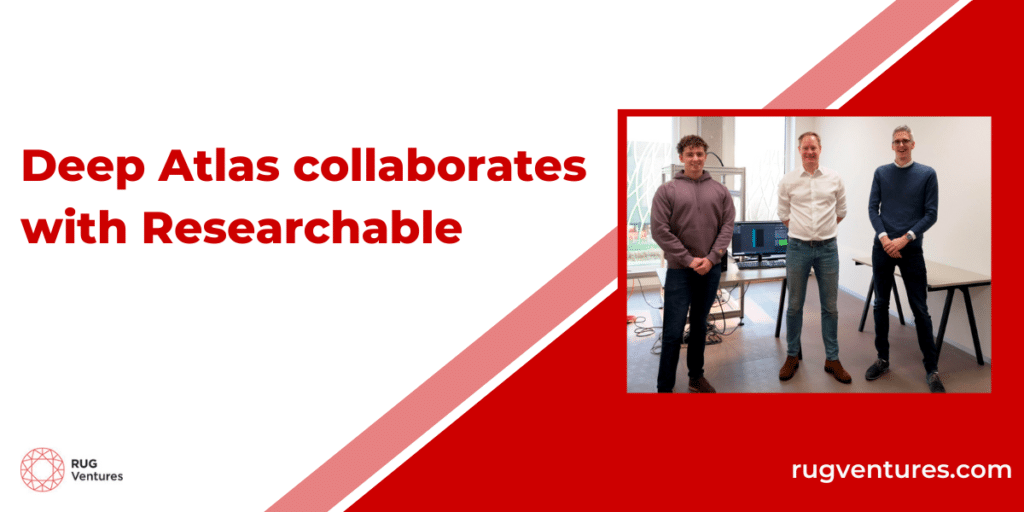Deep Atlas collaborates with Researchable
Deep Atlas, based in Groningen, is currently commercializing its revolutionary technology. Since 2017, the geological innovator has been working on a new method to image the mineralogy and eventually predict the permeability of rock samples from the deep subsurface using artificial intelligence. To better serve the market, Deep Atlas has chosen to collaborate with software and data partner Researchable. The collaboration focuses on further developing, automating, and making market-ready the existing software and algorithms. Researchable specializes in the development and system architecture of data-intensive applications.
Revolutionary technology
Deep Atlas has developed a revolutionary analysis technology that uses artificial intelligence to analyze rocks using its hyperspectral camera. The technology was developed in collaboration with the University of Twente (UT) and the University of Groningen (RUG). The hyperspectral camera makes it possible to collect short-wave infrared (SWIR) spectral data of core and rock samples, and this data forms the basis for accurate predictions about mineralogy and flow behavior. Providing data and predictions on the permeability of rocks is of great value to geothermal energy production, CO2 storage and the gas and oil industry.
“If you compare Deep Atlas’ technology with existing techniques, it’s really a revolutionary technology because it provides much better insight into how rocks are structured,” explains Eduard van Pagée, Business Developer at Researchable. “This is very interesting for reducing uncertainty in planning of drilling for geothermal energy, CO2 storage, or gas and oil.”
Large amounts of data
The hyperspectral camera, which is owned by Groningen-based Deep Atlas, produces hyperspectral images of rocks across the short wave infrared spectrum. These images consist of enormous amounts of data that are then analyzed by a machine learning algorithm developed in collaboration with the University of Groningen (RUG). Future customers of Deep Atlas can expect a continuous and detailed mineralogy dataset compiled in a user-friendly report that will help them better understand the deep subsurface. To automatically process all data into useful information in the form of automatically generated reports, software company Researchable has been enlisted to help.
Wijnand van Eijndthoven, Managing Director at Deep Atlas, is looking forward to the collaboration: “We have asked Researchable to take the existing software to a higher level and automate various processes. By further developing the technology, we can offer our customers an increasingly better service. I look forward to working with Researchable because they have a lot of experience with data-intensive software development.”
—
About Researchable: Researchable is a software development and data company dedicated to helping organizations build software applications with core analytical components like forecasting, machine learning, real-time intelligence, and statistical analysis. The company was founded in 2018 by former computer scientists from the University of Groningen to help other researchers automate their data collection and data analysis. Due to the growing interest by industry to do more with data, Researchable started to focus on this area as well. Today, Researchable is a technical partner for organizations that have the ambition to innovate through data and data-intensive software applications. They work with organizations such as Vitens, UMCG, Leiden University, the Ministry of Defense, and the University of Twente. They are also ISO27001 certified. https://researchable.nl/
About DeepAtlas: Deep Atlas has been working on a groundbreaking method since 2017 to predict the mineralogy and permeability of rocks in the deep subsurface using artificial intelligence. They use a hyperspectral camera to collect data on minerals and rock permeability. This data is processed into a comprehensive and user-friendly report that helps to better understand the deep subsurface. The insights derived from this are particularly interesting for companies in the oil and gas industry, geothermal industry, and CO2 storage industry. By subsurface modeling, more accurate drilling is performed and therefore Deep Atlas contributes to better investment decisions, but also to accelerating the energy transition. The team behind Deep Atlas has decades of experience in the gas and oil industry (e.g. Shell and Schlumberger) and in early 2022, they successfully raised their first round of investment from NOM, G-Force Capital, and RUG Ventures. https://deepatlas.nl/
–
For more information about the collaboration between Deep Atlas and Researchable, please contact Wijnand van Eijndthoven (wijnand@deepatlas.nl) or Eduard van Pagée (b.e.van.pagee@researchable.nl).
